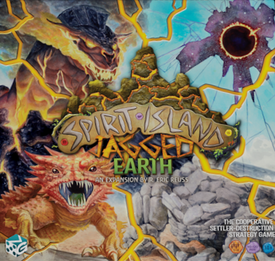 This October is an intense month for Kickstarter, especially because so many of these projects are games that I already know and love, or from designers/publishers whose work I enjoy. I hope for a quiet holiday season, since my Christmas gift budget is already in grave danger... 1. Spirit Island: Jagged Earth I previewed Jagged Earth last week, but I want to mention it here as well--Spirit Island is one of my favorite games, and one of the few I have reviewed on this site to receive a five-star rating from me. If you already like Spirit Island, this expansion is a no-brainer, with more spirits and also cards that allow you to play old spirits in new ways. Additionally there are new island tiles, new adversaries, and new scenarios—in other words, more ways to keep spicing up an already-excellent game. Two thoughts: 1) You need to have both Spirit Island and the first expansion, Branch and Claw, to enjoy Jagged Earth. 2) If you need to wait for retail rather than back now, I think it's totally fine to do so—this is not the kind of game that won't be available on store shelves after it goes to KS backers.  2. Street Masters: Aftershock Street Masters: Rise of the Kingdom has indeed risen into my personal Top 20 solo games. It's an arcade-style beat-'em-up with interesting levels, fighters with different playstyles, and a modular deck system influenced by another favorite game of mine, Sentinels of the Multiverse. My original review of Street Masters is here, and as you can see, I am a pretty big fan. Aftershock promises even more—more fighters, more enemies, more scenarios... I can't wait! No game is for everybody, and Street Masters gets a little cramped at higher player counts. All the same, I think every solo player should at least give this one a look. 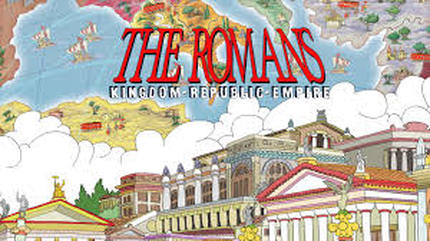 3. The Romans: Kingdom—Republic—Empire! The Latin teacher in me just can't resist having a look at this one. The Romans is being billed as the final game designed by the Ragnar Brothers, and it promises what looks like an especially solo-friendly experience. It's a combination of worker placement and area control, but each player has his or her own individual Roman Empire board to develop. There is also an AI system in place to simulate enemies fighting back as Rome expands. Players will need to shepherd their empires through multiple eras and developments, and increasingly powerful buildings, leaders, and abilities will become available as the game progresses. If you like games with historical themes, this one looks fun—the art is lighthearted, and who doesn't love the Romans? Also interesting is that this campaign is not offering stretch goals. The Ragnar Brothers have made the best game they can possibly make, and they stand by it as-is. I find that refreshing after so much Kickstarter craziness this month.
0 Comments
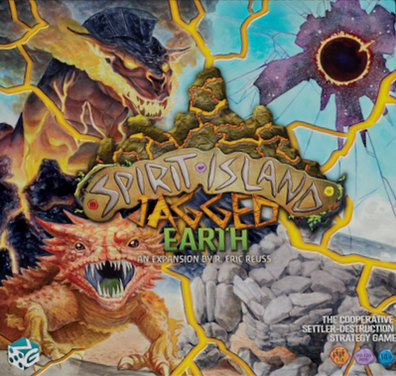 Image swiped from BGG Image swiped from BGG Full disclosure: I was sent a prototype of some aspects of the Jagged Earth expansion by Greater Than Games to try out for this preview. The Jagged Earth campaign will run until November 16, 2018 and can be found here. What is Jagged Earth about? Jagged Earth is the second expansion for Spirit Island, which is one of my absolute favorite board games and which I reviewed last year. If you have not yet played Spirit Island, you should—it's a game in which you (and possibly friends) are island spirits who are helping your native people, the Dahan, fight back against European invaders who are seeking to colonize your island and plunder its natural resources. The Jagged Earth expansion adds several new spirits to the game, as well as new aspect cards that allow you to swap out innate powers and special rules of spirits you already have from the base game, meaning you can play spirits you know and love, but with some fun strategic change-ups. You'll also receive new scenarios and new adversaries to pit yourself against, as well as enough island tiles to accommodate more players and to try new island configurations. In other words, it's a lot more Spirit Island goodness, and if that's your kind of thing, it looks like this expansion will make you very, very happy. What I like about Jagged Earth I love what Jagged Earth represents about Spirit Island--that such a strategically challenging game still has room to grow and ways to surprise me. Spirit Island is one of my very few five-star games on this website, and an expansion that will keep extending the fun for me is more than welcome. I particularly like that there are both new spirits altogether and new ways to play old spirits—the puzzle of figuring out how best to deploy spirit powers is what makes Spirit Island so fascinating to play. Possible Concerns about Jagged Earth I am a solo gamer, and one thing I like about Spirit Island is that it's possible either to play as a solo spirit or to control multiple spirits yourself. Many of the new powers, as well as the new spirits that have been sent to previewers so far, seem like they will play much better as part of a cooperative game with more than one spirit. I don't mind playing Spirit Island two-handed—in fact, I generally think it's better that way—but sometimes I only have enough brainpower to control a single spirit, and with so many cooperative powers in this new expansion, it might not become one that I pull out for pure solo play. That's not a serious problem, and it will in no way prevent me from enjoying Spirit Island and its expansions in their entirety. But if you are a "pure" solo player, what I've seen of this expansion so far may not float your boat. Should I back it? I intend to out of sheer love for and loyalty to Spirit Island, because it's really one of "my" games. However, if you don't have $60 this month and need to wait, I wouldn't panic. Games from Greater Than Games inevitably make it to retail, and you will eventually be able to pick this expansion up after it goes out to backers and hits wider distribution. If you love Spirit Island and aren't obsessed with promos, this expansion will almost certainly make you happy—but you can get it on your own timeline. 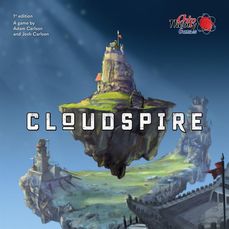 Image from BGG Image from BGG This month on Kickstarter is brutal. BRUTAL. Let's just say that if I had kids, their college funds would be in dire jeopardy. If you don't want to spend money this month, RUN AWAY NOW. 1. Cloudspire I am a pretty big fan of Chip Theory Games, so Cloudspire is my big expense for the month. In fact, I signed up to administer an SAT to be able to afford this thing! It's a tower defense game set in an intriguing fantasy world, in which several floating sky islands have collided and now various groups are fighting for supremacy. The art looks great, and this game is the first foray into modular neoprene that I've ever heard of. Chip Theory is known for producing games with high-quality components, and Cloudspire will be no different. This publisher also sells from its own store online, not through retail outlets, so if you want a Chip Theory game, Kickstarter is the way to go. This is when prices on this game will be best. Plus, while details about solo/co-op play are still emerging, Chip Theory has never let me down on that front. I'm all in. 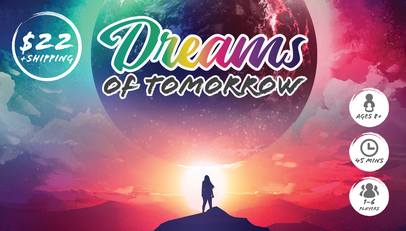 Image from KS Image from KS 2. Dreams of Tomorrow I did a write up of this game here, as well as a playthrough here. It's truly worth a look—it's a cool little small box game with fun solo bots and a fascinating rondel mechanic that makes it something truly special. 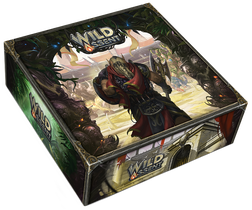 Image from BGG Image from BGG 3. Wild Assent Wild Assent is a miniatures game that involves tactical arena combat as you travel through the wilds, hunting creatures or battling other players gladiator-style. It offers a variety of play modes, including PvP, solo, and co-op, and actually it looks like it's good fun. But my money is already tied up in Cloudspire, and I can't afford another game that has a base pledge of $99 but will really cost you $199 if you want everything. If you're rich as Croesus, however, go for it and let me know how it is!  What is this game about? Holding On: The Troubled Life of Billy Kerr has an intense theme. You (along with your fellow players, should you choose to accept them) are a hospital nurse who is tasked with caring for Billy Kerr, a cantankerous man who is living out his last days, but who isn't quite ready to leave this earth without facing his life's biggest regrets. It's up to you and your medical team to provide him with the care he needs to keep him alive, as well as to gain his trust. As you gain Billy's trust, he will tell you more about his life, allowing you to reconstruct key memories and help him make contact with the people he needs to make his peace with. Eventually, his memories create five timelines comprised of images from Billy's life. The first memory cards you get are hazy, but you are able to tease out clear memories over time. Mechanically, Holding On focuses on balance. As a nursing staff, will you provide Billy with the medical treatment he needs to keep his condition from deteriorating, or will you provide palliative care in an attempt to get him to confide in you? Providing too little medical care can cause you to lose the game by losing Billy, but you will also need to get the memories required by your scenario before the patient deck runs out. Your main currency in the game is care tokens, which are spent on both medical and memory-gathering tasks. Your other main resource is your staff, but be careful—if you overstress yourself, you end up losing memories, care tokens, and, in some scenarios, the game itself. How does it play solo? Holding On is a cooperative game, but it is not truly meant to be played solo. In fact, the "sweet spot" for it is three players, and there are special rules in the rulebook for groups playing with two or four people. However, it is entirely possible to control multiple nurse pawns and play the game on your own. There are some memories that are kept "secret" by the players who acquire them—at least until you all "talk about Billy" at the end of each day—but honestly none of the information is that big of a secret. If you feel a need to discuss Billy's life with someone as you uncover it, you might want to play with others. But I enjoy uncovering stories for myself, and I think it works just fine solo. Overall Thoughts There is a lot to admire about Holding On. We all talk a lot about "board games that tell stories," and I am always waiting for a game that offers a new way of doing just that. Holding On has a compelling story, and all of the flavor text about Billy is great. I found myself pushing through the scenarios to get to that next bit of flavor, and I definitely felt a little bereft at the end of the game. (It's not a spoiler to tell you that Billy is going to die.) However, I was able to enjoy Billy's story in spite of—not because of—the gameplay. The theme is great, the concept is really cool, and theoretically this should have been a home run for me. But honestly, the "game" part of Holding On is a chore. Trying to assign nurses to cover every hospital shift and manage stress makes thematic sense, but it isn't exactly thrilling, at least not for me. Recovering Billy's memories during gameplay was often infuriating. It's not enough to provide palliative care and get partial memories—you also have to take an "inquire" action that allows you to go hunting for clear memories. But your search can be interrupted by event cards, or, worse, you can draw memory cards that don't match the partial memories you've gained. And if they don't match, the clear memory cards get shuffled back into the deck to be discovered another day. This can get very frustrating when you are on the hunt for specific memories. Holding On is a huge creative effort. I am glad I tried it and I want to see more games that get ambitious and take risks. In the end, though, Billy's story might have been better as a graphic novel. The art that depicts his memories is great. But the game part of Holding On, while it technically works, is not actually enjoyable. Do I recommend it? It really depends. If you like experimenting with in-game narratives and this theme is very compelling for you, you might want to give it a shot. The story itself is good. But Holding On is not, in my opinion, entirely successful in its mission to marry a strong story arc with engaging gameplay. Overall Rating: 2.5 Rating Scale: 5 stars — I love it! 4 stars — I really like it. 3 stars — I like it. 2 stars — It's okay. 1 star — Meh. 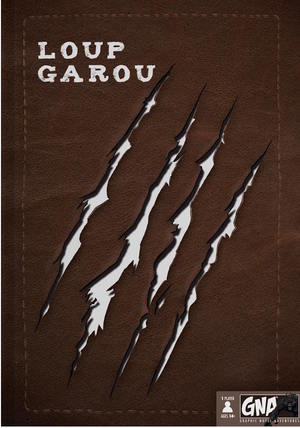 What is this game about? Loup Garou is a game in comic book form, one in which you are a newly-converted werewolf trying to survive and thrive in a hostile world. To navigate through the story, you choose your direction by choosing the next panel to flip to—a system that can take you to some surprising places, especially when combined with Loup Garou's combat system and branching skill tree. There are also plenty of riddles and hidden items to keep it interesting as you navigate through the game. While I don't want to give away the storyline, I will say that Loup Garou offers a very interesting melding of "on-the-rails" storytelling and freedom to explore. The book starts off as a pretty limited survival story, but turns into a sprawling adventure that allows you to navigate through several different areas of towns, while also progressing through an interesting story that successfully hits its plot points. How does it play solo? Loup Garou is geared towards solo play. It's a gamebook, after all! Overall Thoughts There are a lot of features that I particularly liked in Loup Garou. It comes with several elements that make it a bit more complex than just a choose-your-own-adventure book, and it requires a bit of bookkeeping—you will need a character sheet and a spinner or die for combat. (I preferred to use a die.) It's definitely portable. While you could probably blast through most of this game in an afternoon, I carried this book around in my bag for a long time while I was working through it. (If you play it the way I did, I highly recommend taking some notes so you can remember what is going on from session to session.) These minor complexities do not, however, get in the way of you diving in and starting the fun right away. Loup Garou will gradually teach you what you need to know, when you need to know it, and I really appreciated that. Although you start by just going from panel to panel, before long you are tracking gold, items, experience, and your progress on the skill tree. I was happy to see the skill tree—I love those (although I agonize over what to choose), and in this case it added some interest and replayability beyond the storyline. Speaking of the storyline, I was also really impressed by the way that various pathways looped and led it some different directions, but still converged in ways that hit the right story beats without me feeling totally railroaded into them. There is a fine line between freedom to roam and preservation of the story in a gamebook, and I think that Loup Garou does a good job with that. I won't say too much, but things get pretty epic by the end. There are a few irritations, however, that distracted me while playing Loup Garou. While the game informs you that it is possible to pick up items if you are watching the panels carefully and spot hidden ones, it is not always apparent which items are available to pick up and take with you. Some of the pictures are also a little bit unclear—if you find a key, is it a particular special key you were looking for? Additionally, there are a few inconsistencies in the plot of the story that made me scratch my head a bit. However, for what it is, I think Loup Garou is really impressive, and I would definitely try another experience like it. Do I recommend it? If you like gamebooks, yes. Loup Garou has an engaging storyline and enough "game" to it to make it feel like something more than being on the rails. It's not perfect, but it's ambitious and fun. Overall Rating: 3.5 stars Rating Scale: 5 stars — I love it! 4 stars — I really like it. 3 stars — I like it. 2 stars — It's okay. 1 star — Meh. 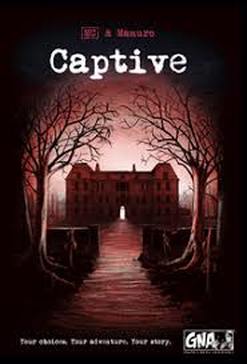 What is this game about? Captive is a combination of comic book and game. You will use a character sheet to track time, attributes, inventory, and health, and within the book you'll make different decisions that direct you to different numbered panels. In Captive, you are a father who is trying to rescue his kidnapped daughter from a creepy old house. As you explore, the reasons for your terrifying situation slowly unfold, and you'll gather the items and information that you need to emerge victorious. That, or you'll discover one of the numerous ways this game can kill you, and you'll have to begin again. While navigating through the book, doors and pathways will be labeled with numbers that let you choose where to go next. But you'll also need to keep an eye out for "hidden numbers," which might be placed on or near objects depicted in a given panel. It is these numbers that help you gather objects and advance the plot of the game. Although Captive is relatively straightforward in terms of its story, it rewards repeated play, because events can play out differently depending on how much in-game time has elapsed before you reach certain areas. There are also items that you need to acquire for certain events to play out. It is possible to "win" on the first or second try, but exploring the book several times to learn all of its secrets will reveal additional information, different outcomes, and alternative pathways. How does it play solo? This game is built for solo play. 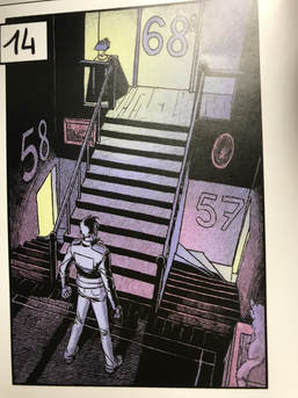 The numbers help you navigate. The numbers help you navigate. Overall Thoughts Captive is definitely worth playing if you enjoy game books and choose-your-own-adventure experiences. The story is fun, and it has plenty of excitement and danger to keep you hooked. Captive has enough complexity to be played a couple of times without it feeling too repetitive, although the plot of the story is simple enough for you to work through all of the possibilities this game can offer in a single afternoon. Unless you like to hang on to your games, Captive might be the sort of thing that you enjoy thoroughly yourself, then pass on to somebody else. This Graphic Novel Adventure does, however, have a few quirks that can dampen your experience, especially if you just want to blaze through the story. It's possible to play Captive on the go, but you really need to play it in a setting where you can concentrate. It is crucial that you be able to look out for hidden numbers, and on top of that, a lot of the rooms and hallways in this book are connected to each other. You'll need to keep excellent track of where you have been and where you haven't, or else you'll find yourself going in circles and getting frustrated. Additionally, there are a few places in the game where you can get "stuck," in that once you reach them, there is no clear way to backtrack. That can be frustrating, especially if you end up in one of those locations when you still had plans to explore previous areas of the game. I enjoyed Captive quite a bit, and I spent a lot of time taking notes and finding everything I could because that's how I like to play. I think Captive is a solid choice no matter what type of gamer you are. It can be fun to wring out every last drop of entertainment, but it's also great to just enjoy the ride a time or two and move on. Do I recommend it? Yes. If you enjoy CYOA books, this will be right up your alley and will be a great way to while away an afternoon or evening. Just be willing to overlook some minor bumps in the road. Overall Rating: 3 stars Rating Scale: 5 stars — I love it! 4 stars — I really like it. 3 stars — I like it. 2 stars — It's okay. 1 star — Meh. 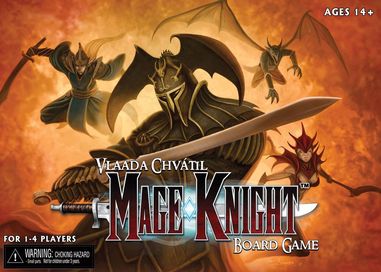 I have some big decisions ahead of me—Nov. 4 is the due date for this year's submissions to the People's Choice Top 100 solo games list! Kevin Erskine remains a hero among men for putting all of this together, and has started his annual submissions thread in the 1 Player Guild on BGG. Here's how it works: Everyone who wants to participate needs to send their top 20 list (you can send a shorter list if you want). Kevin Erskine then works some magic, which I am pretty sure means that he puts all the games into a spreadsheet, assigns points, and sorts out the Top 100 solo games of the year. I will have a rough time with this. I am a game reviewer and I rate games all the time, but my top games list is constantly in flux. I can name some of my all-time favorite games in no particular order, but when it comes to hammering out an organized list of 20 games...? Yikes. Also, I haven't gotten to play all of the solo games I think might be in my Top 20 if I could get some quality time with them. But this is all in good fun, and everyone can submit a different list every year, etc., so there's no harm in giving it a shot. I don't have a ranked list of 20 yet, but here, in no particular order, are a few solo games you'd have to pry from my cold, dead hands. Mage Knight The Lord of the RIngs LCG Sentinels of the Multiverse Spirit Island Hoplomachus: The Lost Cities Baseball Highlights 2045 Gloomhaven Street Masters: Rise of the Kingdom Roll Player Aeon's End Hostage Negotiator Viticulture Limes Nations The Cards of Cthulhu Legendary Encounters: An Alien Deck Building Game There are still so many solo games I need to spend more time with, including Scythe, Too Many Bones, A Feast for Odin, Anachrony, and more. How will I ever play them all? More importantly, how will I ever play them all enough? And war games are still in my future—I've started really eyeing stuff like Comancheria and Liberty or Death. In a few more years, my list could have a totally different flavor to it! But for now, I'll be spending the month of October trying to get some more plays in so that I can come up with a snapshot of my ever-evolving Top 20 list, just in time for November 4. Who else is submitting votes for People's Choice this year? What are some of the games on your short list? 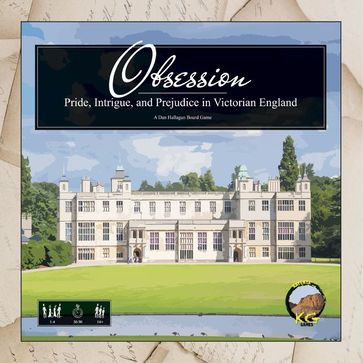 Full Disclosure: Kayenta Games sent me a review copy of Obsession. What is this game about? Obsession, designed by Dan Hallagan of Kayenta Games, isn't technically set in a Jane Austen novel, but it's very much a Pride and Prejudice type of board game. In Obsession, you represent a family that has had a few rough decades, but better times lie ahead—you're starting to improve your estate, and there may even be love in the air! The young and wealthy Fairchilds have moved back to the area, and you have marriageable children who are obviously perfect potential matches for them. The ultimate goal of Obsession is to get victory points, which you can earn in several ways. You will be building impressive add-ons to your estate, trying to meet objectives drawn at the beginning of the game, acquiring fancy new guests for your entourage, and especially trying to catch the eyes of those sexy, sexy Fairchilds. Mechanically, the game is mostly about action selection (deploying your service staff wisely) and hand management (playing the right guests at the right time). During a regular round, you will need to host an event on your property, invite guests, and make sure that the right servants are present to make everything go off without a hitch. As a reward for your fancy parties, you will receive a combination of respect and cold, hard cash. The cash can then be invested in new rooms for your estate, where you can hold bigger and better events. Choose the right areas to develop, and you'll also attract the Fairchild children, one of whom may come and pay you an extended visit. Va-va-voom! How does it play solo? There is a solo mode for Obsession, and it's a lot better than the typical "beat your own score." When playing solo, you can choose from a range of opponents with varying difficulty levels and base scores—victory point amounts that you'll need to beat in order to emerge the winner. Each AI opponent represents a rival family and is represented by a card that shows that family's base score and the level of development that it will be at during each courtship round. If you don't keep up, the AI can steal the Fairchilds' affections away from you and earn extra victory points. AI opponents also have buying priorities and will purchase new properties from the market based on those automated preferences and on die rolls. This keeps the solo game lively, and I like that you can set your level of challenge. One possible quibble with the solo AI, however, has to do with courtship. In a game of Obsession, each courtship round determines who will get a visit from one of the Fairchilds for the season, which provides not only an extra card but some VP perks. If you play with "open courtship," all players can see which aspect of estate building the Fairchilds will prioritize for the season and can plan accordingly. Alternatively, you can play "closed courtship" and get a surprise come season's end. When you are playing solo, this can feel a bit odd, because if you play open courtship, you already know what the AI's score in a given area will be and can concentrate on beating it. If you play closed courtship, you can put your eggs in the wrong basket and get unlucky. I can go either way on this—if you play open, focusing too hard on courtship might mean you aren't pursuing other objectives necessary for victory. If you get a nasty surprise during closed courtship, there are still other ways to earn VP, and thematically I like the idea that you are trying to get a good read on those mysterious Fairchild kids. There is also the Charles Dickens variant(!), in which you reveal the courtship theme card on a random turn during the season, which makes for a nice compromise. Overall Thoughts I think that to get maximum fun out of Obsession, you need to really be committed to the theme—middle school Liz Davidson thought that Colin-Firth-as-Mr. Darcy was the sexiest being in existence. I have read all of the Austen and Brontë novels, plus a... significant... number of Regency romances. I was primed for this game. The flavor text is great, and the theme and mechanics are nicely interwoven. For me, the greatest pleasure of a game of Obsession is making up a story about the guests you throw together at the events you host for them. 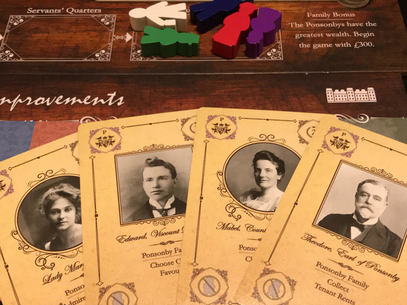 If reading Sense and Sensibility or watching Downton Abbey is not your cup of tea, Obsession may not be a good match for you. The graphic design in this game is nothing special. Mechanically, Obsession is interesting—it's a challenge to manage both the guests in your hand and the servants in your household—but it can also be frustrating. Sometimes you need to reach an in-game goal, but you don't have the right guests and just can't seem to pick up anyone suitable from the draw deck. If you choose to pursue an objective that requires specific room tiles, it can be difficult to actually acquire those rooms. The market is fickle, and there aren't many duplicate copies of room tiles to draw. If you're playing Obsession purely for the mechanical process of earning victory points, you aren't going to have as much fun, and the game won't make as much sense. In fact, to really get a sense of the rules, you need to do more than read the main rulebook. There is a second book, a thematic index of everything in the game, that will really give you all the details. Don't let it freak you out--Obsession flows quickly and easily once you have gotten into the rhythm of it. I actually ended up liking the extra glossary because I learned more about a time period I am interested in. However, your mileage may vary. As a solo player, I am delighted to see a solo mode that is truly aimed at my satisfaction as a solo player. Although you can see ahead of time how an opponent's estate will develop from round to round, I just tell myself that I have very nosy servants who are good at surveillance of rival families. I love that there are multiple opponents to choose from, and that those opponents interact with the market in a way that makes me watch the improvement tiles like a hawk. I think Obsession offers a good solution to the "beat your own score" problem found in so many solo games with a Euro vibe to them—I would love to see something like this for Legacy: The Testament of Duke de Crecy, another game I really enjoy that has a similar family-prestige-building theme. Do I recommend it? If you like Jane Austen and can really get into the theme, yes. If a BBC period piece comes on TV and you roll your eyes, run away. Overall Rating: 4 stars Rating Scale: 5 stars — I love it! 4 stars — I really like it. 3 stars — I like it. 2 stars — It's okay. 1 star — Meh. 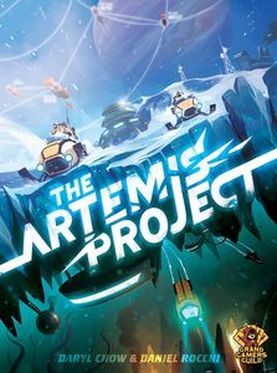 This week, there are a few interesting-looking solo-playable games on Kickstarter to talk about, but I've still got my eye on mid-October. By the time the middle of the month hits, we'll be getting blasted by so many awesome-looking campaigns that I am legitimately worried I won't be able to back something I really want. Budget carefully, my friends. 1. The Artemis Project The Artemis Project is a game about colonizing Europa, one of Jupiter's moons. At its heart, this in engine building game, as players are trying to build the most powerful engine and thus the most successful colony. Europa is rich in resources if you know how to get at them. The main mechanic of Artemis Project is dice placement—place your dice cleverly, and you will yield the best results. The rules of this game are still subject to last-minute development/polishing, but Jeremy from Jambalaya Plays Games recently published an overview of the solo mode to YouTube. There are only about 4 days left in this campaign, so act fast if you want it! 2. Viceroy: Times of Darkness Yet another Viceroy campaign is on Kickstarter, so if you're a fan of the game, rejoice! It hasn't pulled me in yet, but the art looks great, and it's clear this game is getting a lot of support from its publisher. This particular expansion is of note because it features revised rulesets for 1 and 2 players, so if you're into Viceroy and you're into solo gaming, it's clear you are being catered to in this campaign. 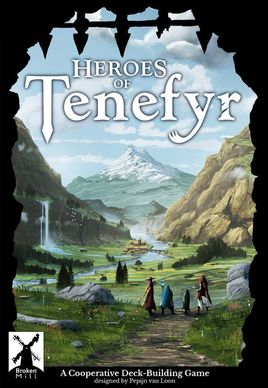 3. Heroes of Tenefyr Heroes of Tenefyr is a cooperative deck building game, one that claims it can be taught in about 5 minutes. In my opinion, that's usually a good thing for a board game. In Heroes of Tenefyr, players will enter dungeons and resolve combat situations using a push-your-luck combat system. As you defeat enemies and clear dungeons, you will acquire coveted loot. But as you keep drawing cards from your deck to favorably resolve combat, you'll get into situations where you need to rest and recover expended cards—a move that brings a big boss closer to attacking you. It seems like a flexible and potentially fun mashup of deck builder and dungeon crawl, and it's only about $20 (...plus $9 shipping to the U.S.). If you like to support first-time Kickstarter publishers, then this is your chance--Heroes of Tenefyr is Broken Mill's first KS project. |
AuthorMy name is Liz Davidson, and I play solo board games. A lot of solo board games... Archives
August 2021
Categories
All
|
 RSS Feed
RSS Feed